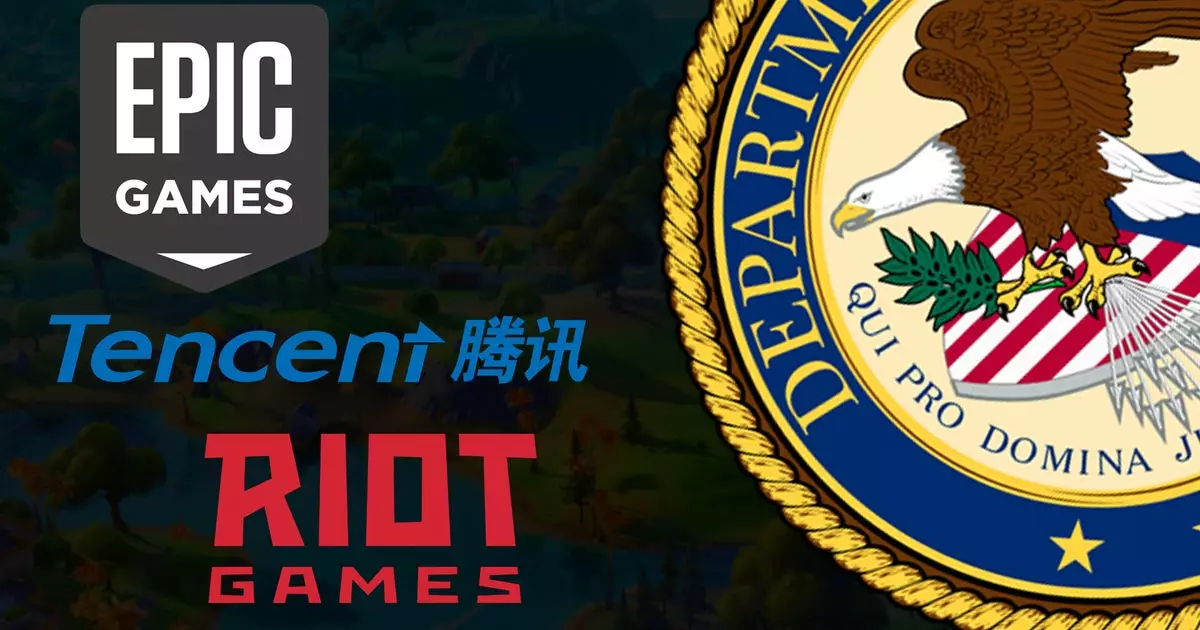In a dramatic turn of events within the gaming industry, two influential members of the board of directors at Epic Games have departed their positions amid an investigation by the United States Department of Justice (DoJ) focusing on antitrust implications. This significant fallout raises critical questions not only about corporate governance but also about the regulatory landscape that governs competition within the dynamic realm of video gaming.
The resignations of Ben Feder and David Wallerstein, who were appointed to Epic’s board by Tencent, shed light on an intricate web of corporate relationships that dominate the gaming sector. Tencent, a Chinese conglomerate with substantial investments across the industry, owns Riot Games. The DoJ’s scrutiny into these appointments is rooted in the Clayton Act, a piece of legislation designed to prevent anticompetitive practices by prohibiting individuals from serving on the boards of competing firms. The situation raises legitimate concerns about conflicts of interest when the lines between competitors blur as they do in the case of Epic and Riot.
The key issue at stake here is the definition of competition in an industry where companies often collaborate while also vying for market share. Allowing representatives from Tencent, which has significant clout over a direct competitor, to sit on the board of Epic poses potential risks to fair competition. Much like allowing an executive from Coca-Cola to sit on Pepsi’s board, such entanglements could skew strategic decisions adversely affecting market dynamics and consumer choices.
The broader implications of these resignations resonate far beyond the halls of Epic Games. Antitrust laws, particularly as they pertain to the rapidly evolving tech and gaming industries, are gaining increasing attention from regulators. With major corporations frequently merging or forming collaborations, the scrutiny from entities like the DoJ has heightened, as evidenced by past legal challenges against other industry giants.
For example, Valve faced antitrust allegations several years ago, illustrating the precarious nature of competition in the gaming sector where download platforms and game development houses must navigate complex legal frameworks. Moreover, Microsoft’s controversial acquisition of Activision Blizzard, which garnered intense regulatory review, highlights the ongoing dialogue about market consolidation and fair competition—a dialogue that is now extending to executive governance structures.
Following the investigations, Tencent has committed to revising its shareholder agreement with Epic Games, an essential move to mitigate regulatory concerns and establish more transparent governance practices moving forward. This adjustment signals an acknowledgment of the potential risks associated with boardroom overlap and aims to rebuild trust with regulators, stakeholders, and the broader gaming community.
The necessity of checks and balances within corporate governance is further underscored by this event. Companies like Epic must remain vigilant to ensure that their boards are not only diversified in terms of expertise and experience but also free from conflicting interests that could jeopardize their competitive standing. The resignations serve as a reminder that governance structures must not only prioritize operational effectiveness but also adhere to legal standards designed to maintain fair competition.
In the wake of these developments, the gaming industry is positioned at a crossroads. With a delicate balance between collaboration and competition, companies must tread carefully in their strategies and boardroom decisions. The resignations of Feder and Wallerstein mark a significant moment, illuminating the need for corporate responsibility in maintaining competitive integrity—not just to adhere to legal mandates, but to foster a fair and vibrant gaming ecosystem for consumers and developers alike.
As Epic Games prepares to navigate this new chapter, the response to antitrust scrutiny may well shape its corporate identity for years to come, influencing both industry standards and consumer perceptions in the competitive landscape. Only time will tell if these regulatory adjustments will translate into lasting changes that promote a healthier, more innovative gaming environment.


Leave a Reply